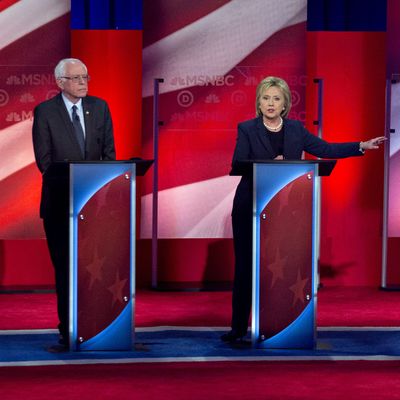
Hillary Clinton and Bernie Sanders have been debating an idea for weeks before Sanders finally put into words what separates them. “You can be a moderate. You can be a progressive. But you cannot be a moderate and a progressive,” he wrote. The first half hour of their New Hampshire debate put a fine point on this divide. Sanders wants to define progressivism as a party-wide Democratic ideology, and Clinton is fiercely resisting.
As a simple political tactic, Sanders’s case is strange. Only 41 percent of Democrats self-identify as liberal; 56 percent call themselves moderate or conservative. But 50 years ago, conservatives constituted a minority within the Republican Party, until the Goldwater movement set out to conquer it. Today, conservatism is synonymous with Republicanism; no Republican candidate would eschew the label. When Sanders confessed, “Let me be frank. I do want to see major changes in the Democratic Party,” he was telling the audience that he envisioned a deep and thorough overhaul of the party — which should not come as a surprise, since he is not even a member of it.
Clinton began the debate by frontally engaging Sanders’s case against moderation. Sanders has defined Clinton’s acceptance of Wall Street donations as inconsistent with her being a progressive. Clinton noted in response that President Obama has also accepted Wall Street donations, so Sanders’s definition would exclude him as well. She framed this response as a trap, but rather than fully ensnare Sanders upon a contradiction, it proceeded instead to reveal the profound ideological gulf between them.
Clinton argued that, despite having received millions from Wall Street, Obama had passed the Dodd-Frank financial reforms. In Clinton’s telling, which is also the account of most liberal economists, Dodd-Frank is the basis for effective financial reform. It has deeply reduced systemic risk, reducing financial leverage, bringing trades out of the shadows and eliminating the incentive for banks to grow too big to fail.
Sanders did not so much dispute the efficacy of Dodd-Frank as to broaden the question. His fixation with Wall Street is not systemic risk — i.e., the chance that another crash will trigger an economic meltdown. He frames Wall Street as a problem of political economy, not economy. Wall Street is so big and rich that it is inherently dangerous, and will by its nature corrupt the political system.
Clinton does not believe that. Her political ideal is what some political scientists have called “pluralism.” A pluralist politics venerates the careful balancing of competing interests. It is okay to bring business to the bargaining table as long as there is also a place for labor, environmentalists, consumer advocates, and other countervailing interests. Clinton’s Democratic Party, and Obama’s, is one in which pluralist agreements struck important progress not only in financial reform but also health care, public investment, green energy, and other priorities.
Sanders does not completely reject the products of these pluralist compromises. (He grudgingly accepts them as worthwhile, piecemeal steps.) What he rejects is the political model that treats pluralism as the normal model of political action. Sanders believes the interest of the public is not divided, it is united, and only the corrupt influence of big business has thwarted it. He consequently vows to smash its power through a combination of a mass upsurge in political activism and campaign-finance reform.
That was the vision Clinton challenged tonight. She declared, pointedly, “I’m not making promises I cannot keep.” And her campaign blasted out emails attacking “Bernie’s Unachievable Revolution.” She tied her beliefs to those of the Obama administration, whose method of incremental progress and negotiation with business she embraced.
For all their personal congeniality and determination not to personalize the debate, the divide that opened between the two is a seminal moment in modern Democratic politics. A Democratic Party as monolithically statist as the modern Republican Party is anti-government — one in which any defense of free markets or business is dismissed — would look very different than anything within American historical experience. After decades of this being taken for granted, it has finally become necessary to defend moderation as a governing creed.






























